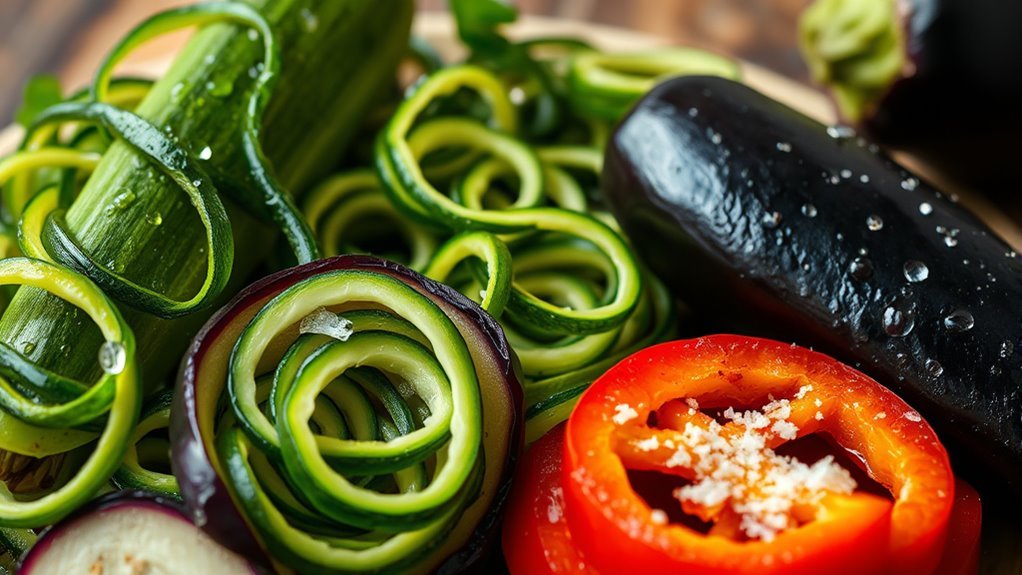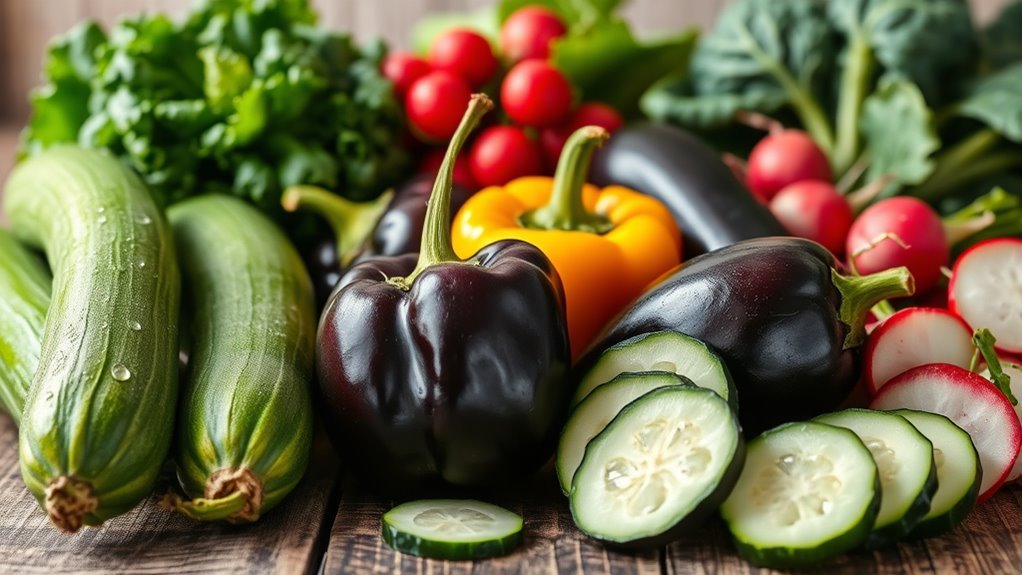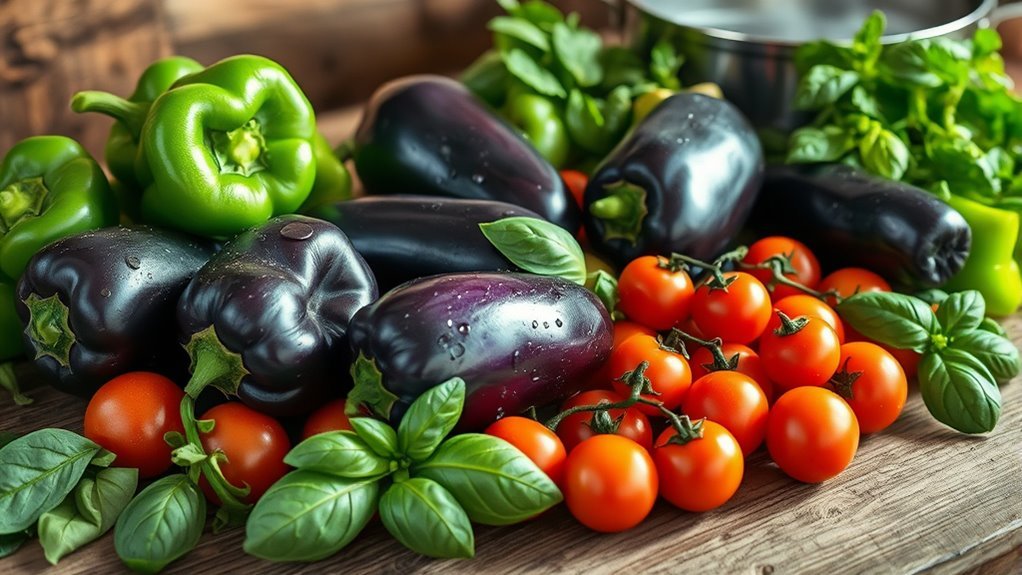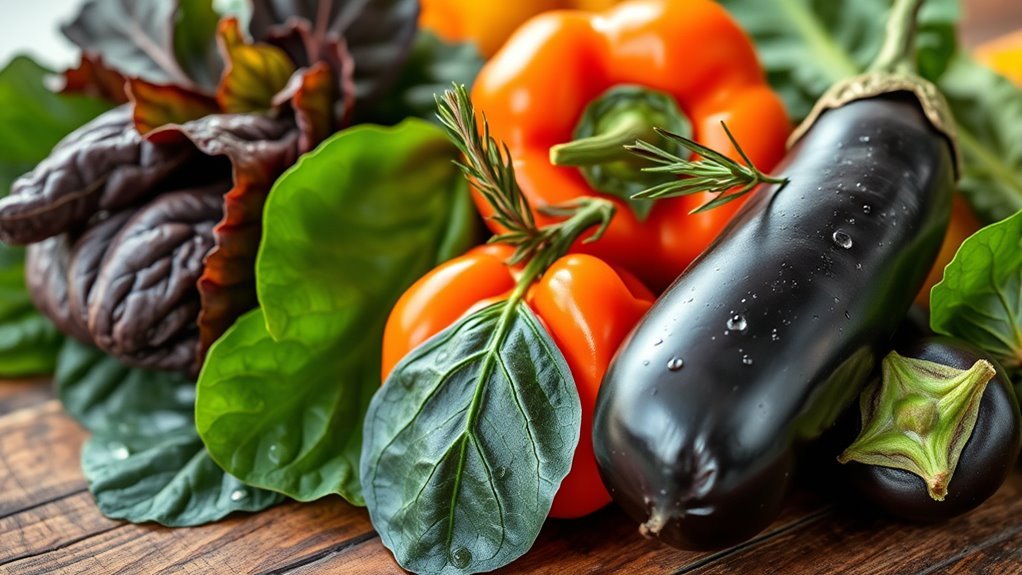Yes, you can eat vegetables on a ketogenic diet! Focus on low-carb, non-starchy options like spinach, zucchini, cauliflower, and broccoli. These veggies provide essential nutrients without greatly impacting your carb count. Portion control is important, so aim for serving sizes like 1 cup for leafy greens and 1/2 to 1 cup for others. Cooking methods like roasting or grilling can enhance their flavors. Discover more about maximizing your vegetable intake while staying within keto guidelines.
Understanding Carbohydrates in Vegetables

When you’re following a ketogenic diet, understanding carbohydrates in vegetables is vital for maintaining your desired state of ketosis. Vegetables contain different carbohydrate types, primarily fiber and sugars. Fiber, which is often found in non-starchy vegetable varieties, can be beneficial since it doesn’t greatly impact your carb count. On the other hand, starchy vegetables tend to have higher sugar content, which can hinder your ketosis goals. It’s important to recognize that not all vegetables are created equal; some are lower in net carbs, making them more suitable for your diet. By focusing on low-carb options, you can enjoy the nutrient-rich benefits of vegetables while still giving yourself the freedom to thrive within your ketogenic lifestyle.
Best Low-Carb Vegetables for Keto

Finding the right low-carb vegetables for your ketogenic diet can make all the difference in staying on track with your goals. Including keto vegetable varieties in your meals not only adds nutrients but also keeps your carb count low. Here are some great low carb options to take into account:
- Spinach: Packed with vitamins and minerals, it’s versatile in salads and smoothies.
- Zucchini: Perfect for spiralizing into noodles or roasting as a side dish.
- Cauliflower: A fantastic substitute for rice or mashed potatoes, rich in fiber and low in carbs.
Non-Starchy Vegetables to Include in Your Diet

When you’re following a keto diet, incorporating non-starchy vegetables is essential for maintaining nutrition while keeping carbs low. These vegetables, like spinach and zucchini, offer a range of vitamins and minerals without spiking your blood sugar. Let’s explore some of the best non-starchy choices and their nutritional benefits.
Best Non-Starchy Choices
What makes non-starchy vegetables an essential part of a keto diet? They’re low in carbs and high in nutrients, making them perfect for your keto lifestyle. Incorporating a variety of keto vegetable varieties can enhance your meals while keeping your carb count in check. Here are some of the best non-starchy options to include:
- Spinach: Packed with vitamins and minerals.
- Zucchini: Versatile for zoodles or grilling.
- Cauliflower: Great for rice substitutes and mash.
When planning your meals, these choices not only provide flavor but also contribute to your overall health. Use these meal prep tips to guarantee you always have these veggies on hand, making it easier to stay on track with your keto goals while enjoying your food!
Nutritional Benefits Explained
Non-starchy vegetables not only support your keto diet by keeping carbs low, but they also offer a wealth of nutritional benefits that can enhance your overall well-being. These vegetable varieties are packed with essential vitamins, minerals, and fiber, contributing to high nutrient density. Including them in your meals can help maintain energy levels and promote digestive health.
| Vegetable | Nutrient Density | Keto-Friendly Serving Size |
|---|---|---|
| Spinach | High | 1 cup raw |
| Zucchini | Moderate | 1 cup sliced |
| Broccoli | High | 1 cup chopped |
| Cauliflower | High | 1 cup chopped |
| Bell Peppers | Moderate | 1 cup sliced |
Incorporating these veggies can make your keto journey not just effective, but enjoyable!
Ways to Prepare and Cook Keto-Friendly Vegetables
Although many people think of vegetables as simply a side dish, there are numerous ways to prepare and cook keto-friendly vegetables that can elevate their flavor and nutritional value. You can experiment with grilling techniques to bring out the natural sweetness of vegetables like zucchini and bell peppers. Alternatively, using sautéing methods allows you to infuse your veggies with healthy fats, enhancing taste and texture.
Here are a few delicious preparation ideas:
- Roast with olive oil, garlic, and herbs for a savory twist.
- Steam lightly to retain nutrients while keeping them tender-crisp.
- Stir-fry with your favorite keto-friendly protein for a satisfying meal.
These methods not only keep it exciting but also align perfectly with your keto lifestyle!
Nutritional Benefits of Vegetables on a Ketogenic Diet
When you’re on a ketogenic diet, incorporating vegetables can provide essential vitamins and minerals that support overall health. These nutrients are vital for maintaining energy levels and various bodily functions. Additionally, the fiber found in many vegetables aids in digestive health, helping you feel full while staying within your carb limits.
Essential Vitamins and Minerals
Incorporating a variety of vegetables into your ketogenic diet can greatly enhance your intake of essential vitamins and minerals. These nutrient-dense foods serve as excellent vitamin sources, helping you meet your daily requirements while maintaining ketosis. Plus, certain vegetables can improve mineral absorption, ensuring your body utilizes these nutrients effectively.
Consider these benefits of adding vegetables to your meals:
- Vitamin K: Supports bone health and blood clotting.
- Potassium: Aids in muscle function and regulates blood pressure.
- Magnesium: Important for energy production and muscle relaxation.
Fiber for Digestive Health
While many people associate the ketogenic diet primarily with high-fat and low-carbohydrate foods, it’s important to recognize that fiber-rich vegetables play an essential role in supporting digestive health. Incorporating these vegetables can enhance gut health by providing the fiber necessary to promote regularity and prevent constipation. Fiber acts as a prebiotic, feeding beneficial gut bacteria and encouraging the production of digestive enzymes. This balance is vital, especially on a keto diet, which can sometimes lead to digestive issues due to its lower fiber content. By choosing non-starchy vegetables like leafy greens, broccoli, and zucchini, you can enjoy the freedom of a varied diet while ensuring your digestive system remains healthy and efficient.
Portion Control and Serving Sizes for Keto Vegetables
Understanding portion control and serving sizes for keto vegetables is essential for staying within your daily carbohydrate limits. While vegetables are nutritious, their carb content can add up quickly. Here are some serving recommendations to keep in mind:
Effective portion control of keto vegetables is crucial for managing your carb intake and maximizing nutrition.
- Aim for about 1 cup of leafy greens per serving.
- For non-starchy vegetables like zucchini or bell peppers, stick to 1/2 to 1 cup.
- Remember that portion sizes can vary, so weigh or measure if you’re unsure.
Creative Recipes Featuring Low-Carb Vegetables
When you’re on a keto diet, finding creative ways to include low-carb vegetables in your meals can make all the difference in maintaining variety and flavor. Try whipping up some creative stir frys with zucchini, bell peppers, and broccoli, tossed in coconut aminos for a savory kick. Another delicious option is roasted veggie medleys—combine cauliflower, asparagus, and Brussels sprouts with olive oil, garlic, and herbs, then roast until tender. These dishes not only satisfy your taste buds but also keep your carb count in check. By experimenting with spices and cooking methods, you’ll discover how enjoyable low-carb vegetables can be, giving you the freedom to enjoy diverse and flavorful meals while sticking to your keto goals.
Frequently Asked Questions about Eating Vegetables on Keto
1. Can I eat any vegetables on a keto diet?
Yes, you can eat vegetables on a keto diet, but it’s important to choose low-carb options. Non-starchy vegetables such as leafy greens (spinach, kale), broccoli, cauliflower, zucchini, and bell peppers are excellent choices. These vegetables are low in carbohydrates and high in fiber, making them suitable for maintaining ketosis.
2. What are the best low-carb vegetables for a keto diet?
Some of the best low-carb vegetables for a keto diet include:
- Spinach
- Kale
- Broccoli
- Cauliflower
- Zucchini
- Asparagus
- Cucumbers
- Bell Peppers
- Radishes
- Green Beans
These vegetables are nutritious and provide essential vitamins and minerals while keeping your carb intake low.
3. Are there any vegetables I should avoid on a keto diet?
Yes, some vegetables are higher in carbohydrates and should be limited or avoided on a keto diet. These include starchy vegetables such as:
- Potatoes
- Sweet Potatoes
- Corn
- Peas
- Carrots
These vegetables can significantly raise your carb intake and may hinder your ability to remain in ketosis.
4. How do vegetables fit into my daily carb allowance on keto?
On a keto diet, the typical daily carb allowance ranges from 20 to 50 grams of net carbs. When planning your meals, it’s important to account for the carbohydrates from vegetables. Aim to prioritize low-carb vegetables while keeping track of your portion sizes to ensure you stay within your daily limit. Incorporating a variety of low-carb vegetables can help you meet your nutritional needs without exceeding your carb limit.
5. Can I eat vegetables raw on a keto diet?
Yes, you can eat raw vegetables on a keto diet. Many low-carb vegetables are delicious and nutritious when eaten raw, such as cucumbers, bell peppers, and leafy greens. Raw vegetables can also provide a satisfying crunch and retain more nutrients compared to cooked ones. However, cooking some vegetables, like broccoli or cauliflower, can make them easier to digest and enhance their flavors. Ultimately, it depends on your personal preference and dietary needs.
References
- https://www.healthline.com/nutrition/vegetables-on-keto
- https://www.ncbi.nlm.nih.gov/pmc/articles/PMC6520665/
- https://www.webmd.com/diet/obesity/what-is-ketogenic-diet
- https://www.cdc.gov/healthyweight/healthy_eating/vegetables.html
- https://www.mayoclinic.org/healthy-lifestyle/nutrition-and-healthy-eating/expert-answers/keto-diet/faq-20485207
- https://www.hsph.harvard.edu/nutritionsource/healthy-weight/diet-reviews/keto-diet/
- https://www.jamanetwork.com/journals/jama/fullarticle/2736585


